Local nonprofit leaders decry Texas abortion ban, reflect on reproductive justice in PA
 October 20, 2021
Category: Featured, Long, Purpose
October 20, 2021
Category: Featured, Long, Purpose
Senate Bill 8, the Texas law banning abortion after about six weeks of pregnancy, has been hotly debated since it went into effect on September 1.
Subsequently, the Biden administration has moved swiftly in the past several weeks fighting to stop the ban. On Monday, the Biden administration called on the Supreme Court to temporarily block the law and to add the question of its constitutionality to the Court’s docket. The federal appeals court responsible for Texas has until Thursday to file a response.
This is the most recent judicial development in a series of actions from both sides fighting over the controversial law’s future.
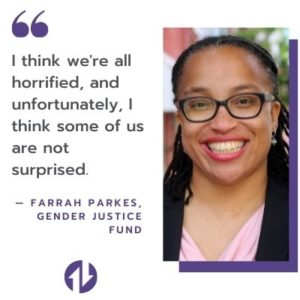 With its passage, S.B. 8 became the most restrictive abortion law in the U.S. And as its fate hangs in the balance, reproductive rights advocates across the country and in Pennsylvania have decried the law while reflecting on abortion access locally.
With its passage, S.B. 8 became the most restrictive abortion law in the U.S. And as its fate hangs in the balance, reproductive rights advocates across the country and in Pennsylvania have decried the law while reflecting on abortion access locally.
“I think we’re all horrified, and unfortunately, I think some of us are not surprised,” said Farrah Parkes, executive director of the Gender Justice Fund. “Anti-abortion forces have been very organized. They have been very persistent. And they have been working up to this point.”
S.B. 8 bans abortion after cardiac activity has been detected, which is at about six weeks into a pregnancy. Due to the nature and length of menstrual cycles, many people do not even know they’re pregnant this early on in a pregnancy.
“When someone who has a 28-day menstrual cycle first misses a period, they are considered to be four weeks into pregnancy, so that’s the point when some people first might have an inkling that they could be pregnant,” said Roxanne Sutocky, director of community engagement for The Women’s Centers.
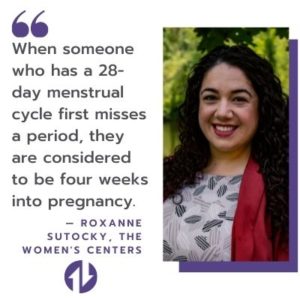 The Women’s Centers are a group of independent abortion providers specializing in first and second trimester abortion care services. There are Pennsylvania locations in Philadelphia and Delaware County. There are three other locations throughout the U.S., including one in Cherry Hill, New Jersey.
The Women’s Centers are a group of independent abortion providers specializing in first and second trimester abortion care services. There are Pennsylvania locations in Philadelphia and Delaware County. There are three other locations throughout the U.S., including one in Cherry Hill, New Jersey.
“Many people from there are going to give it a few days until they take a test, maybe take another test to confirm a pregnancy at potentially five weeks,” Sutocky added. “We’re talking about a really best-case scenario there.”
This timeline doesn’t account for the irregularity of menstrual cycles for some people who use medications or experience hormonal disruptions, among other reasons for a delayed period, Sutocky added.
When accounting for the time it takes for someone to schedule an abortion, gather funds and travel for the procedure, the six-week ban effectively outlaws abortion for most people in Texas.
“Even if you know that you’re pregnant before the decisional limit, you still have to be able to get seen and have your abortion care and because of the logistical burdens of accessing care in a state that heavily restricts abortion access, it makes it nearly impossible for many people to actually do so,” said Christine Castro, staff attorney at Women’s Law Project.
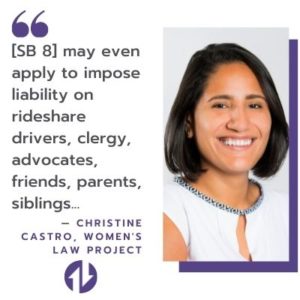 The ban is also controversial because it allows for private citizens to file lawsuits against abortion providers and anyone who “aids and abets” a person in obtaining an abortion while collecting $10,000 in damages for successful lawsuits. The way the law is written also makes the extent of who may be liable unclear.
The ban is also controversial because it allows for private citizens to file lawsuits against abortion providers and anyone who “aids and abets” a person in obtaining an abortion while collecting $10,000 in damages for successful lawsuits. The way the law is written also makes the extent of who may be liable unclear.
“It may even apply to impose liability on rideshare drivers, clergy, advocates, friends, parents, siblings, the person that impregnated the pregnant person,” Castro added. “It really does have this broad sweeping impact in terms of liability, and it’s unique. This is what has made this law so cruel.”
S.B. 8 also does not make any exceptions in cases of rape, incest or sexual abuse.
Abortion access advocates have said restrictions like S.B. 8 in Texas disproportionately impact groups of people who are already marginalized in seeking care, such as people of color, young people and those who are experiencing poverty.
 Elicia Gonzales, executive director of the Women’s Medical Fund, said the Philadelphia-based nonprofit provides nearly 300 people with funding for abortion care each month. Gonzales said all of the people who call WMF are living in deep poverty and earning an average annual salary of about $8,300. Gonzales also said 73% of these people are already parenting at least one child.
Elicia Gonzales, executive director of the Women’s Medical Fund, said the Philadelphia-based nonprofit provides nearly 300 people with funding for abortion care each month. Gonzales said all of the people who call WMF are living in deep poverty and earning an average annual salary of about $8,300. Gonzales also said 73% of these people are already parenting at least one child.
“We really think that being able to control if you have children, when you have children, how many children you have is really at the heart of being able to be a liberated person,” Gonzales said. “We also know that it’s just so closely connected to economic stability.”
Reproductive rights advocates in Pennsylvania feel protected from the passage of a ban like S.B. 8 because of Governor Tom Wolf’s commitment to veto any such legislation. But relying on the power of one person is not a long-term plan for ensuring abortion access, advocates said.
“That works for now, but we know that there’s a governor’s race next year,” said La’Tasha D. Mayes, president & CEO of New Voices for Reproductive Justice. “We cannot rely on a supportive governor to veto anti-abortion bills when the legislature is decidedly against the ability of women and folks who need abortions to have access to that care.”
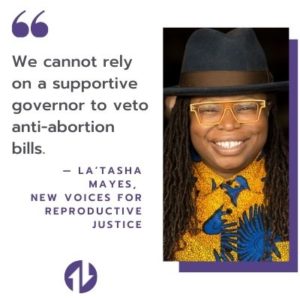 There are already many hurdles to accessing care in Pennsylvania because of the Pennsylvania Abortion Control Act. There is state-mandated counseling and a required 24-hour waiting period prior to the procedure. There is also the requirement for parental consent for those who are under the age of 18 seeking an abortion.
There are already many hurdles to accessing care in Pennsylvania because of the Pennsylvania Abortion Control Act. There is state-mandated counseling and a required 24-hour waiting period prior to the procedure. There is also the requirement for parental consent for those who are under the age of 18 seeking an abortion.
The federal Hyde Amendment also bans use of Medicaid for almost all abortions. And since 1985, Pennsylvania has also banned state Medicaid coverage for abortions.
Travel can be another barrier in Pennsylvania because there are now less than 20 abortions clinics, according to Planned Parenthood Pennsylvania Advocates. There were more than 145 abortion clinics when Roe v. Wade was passed in 1973.
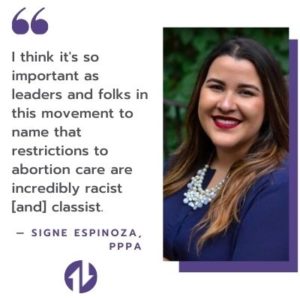 One in four women will have an abortion in their lifetime. Espinoza herself had an abortion when she found out she was pregnant in college. She didn’t even know she was pregnant at six weeks, she said.
One in four women will have an abortion in their lifetime. Espinoza herself had an abortion when she found out she was pregnant in college. She didn’t even know she was pregnant at six weeks, she said.
“I found out that I was pregnant and in that moment, I knew I didn’t want to be immediately. It was a no-brainer,” she said. “I knew what I wanted out of my college experience, and it was definitely not to become a parent.”
Espinoza said sharing abortion stories can be a way to reduce stigma. Those who support abortion access can also organize, contact their representatives and donate to organizations like Planned Parenthood.
“We help each other wherever we are, so it’s not like, ‘Oh, they’re in Texas, they’ll have to figure that out,’” Mayes added. “It’s about strategizing together. It’s about redirecting resources to them, so they can fight the fight on their home turf. And they will do the same for us.”
In addition to the PA organizations working to ensure reproductive justice, if people want to donate, Espinoza offered a list of Texas organizations “that was uplifted by TX on-the-ground organizers on the National Day of Action on Sept. 1”:
Trending News










